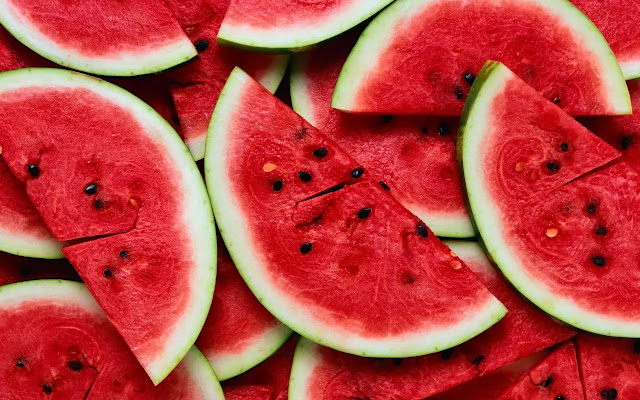Health Benefits of Watermelon
Health Benefits of Watermelon: A crisp, juicy, cool slice of watermelon best captures the essence of summer. It's a mainstay of backyard barbecues, and your neighborhood farmers' markets are packed with it right now. According to the National Watermelon Promotion Board, watermelon can be classified as either a fruit or a vegetable. It is also highly nutritious.
According to nutritionists, watermelon is an excellent complement to a balanced diet because it is low in calories and sugar and packed with vitamins, minerals, and antioxidants. And it's entertaining to eat! According to Kris Solid, MS, RD, senior director of nutrition communications at the International Food Information Council, "eating watermelon makes me feel carefree, like a kid again at a summer picnic enjoying the outdoors with the people I care about most."
Watermelon Nutrition Facts
The following is what one cup (152 g) of watermelon contains, per the U.S. Department of Agriculture:
Is it okay to eat watermelon every day?
According to the Centers for Disease Control and Prevention, only 10% of Americans consume the recommended two cups of fruit each day (CDC). You may consume many servings of watermelon every day without worrying about the long-term effects of your diet because it is low in calories and sugar. However, Solid advises that it is ideal for your nutritional health to attempt to vary the types of fruit you eat. Eating a variety of fruits will guarantee that your body receives all the nutrients it needs. Different fruits have different nutrients.
According to Grace Derocha, RDN, CDCES, national spokesperson for the Academy of Nutrition and Dietetics, anything can be consumed in excess, even watermelon. Although it can be tempting to consume half or more of an entire watermelon in one sitting on a hot summer afternoon, experts like Derocha advise against doing so. Instead, they suggest eating one cup at a time.
According to Derocha, watermelon is a high-FODMAP (fermentable oligosaccharides, disaccharides, monosaccharides, and polyols) fruit, which means it contains short-chain sugars that some people find difficult to digest. As a result, Derocha warns that excessive consumption of this fruit "may cause bloating or discomfort."
She goes on to say that those who have diabetes or who may need to track their carbohydrate consumption should be very careful about how much watermelon they consume. Consuming excessive amounts of fruit may result in blood sugar changes, which can be dangerous for those with diabetes.
What are the Health Benefits of Watermelon?
According to Christina Meyer-Jax, RDN, LDN, Standard Process nutrition chair, and assistant professor at Northwestern Health Sciences University, "Watermelon is a naturally low-calorie package." It provides important antioxidant elements that help general wellness and the prevention of disease.
Here Are Some Health Benefits of Watermelon:
1) It's frontloaded with essential nutrients.
Watermelon provides a nutritional punch for only 46 calories per cup. It also has a plethora of other vitamins and minerals, such as potassium, vitamin A, and vitamin B6, in addition to around 15% of your recommended daily intake of vitamin C, according to Solid.
According to Derocha, vitamin C boosts immunity and aids in iron absorption, whereas vitamin A is essential for maintaining healthy skin and eyes. Along with vitamin B6, which helps the body break down the proteins you eat and also strengthens the immune system and neurological function, watermelon is also a good source of potassium, which helps lower blood pressure and promotes nerve function.
2) Watermelon helps keeps you hydrated.
More than 90% of a watermelon's weight is water. As the name suggests, watermelon can help you stay hydrated, says Derocha. "We get 80% of our hydration from drinking and 20% from eating; watermelon can undoubtedly help with this balanced intake," the author says.
Most individuals don't drink enough water, which is a problem because staying hydrated is crucial during the summer when the temperature rises and you could sweat out fluids.
Meyer-Jax advises consuming watermelon that has been lightly salted after working out or when you've been perspiring for a while. Restoring lost electrolytes and carbohydrate storage is made possible by the combination of salt and carbohydrates, according to the expert.
3) It offers a big dose of lycopene.
Watermelon and other fruits and vegetables contain the naturally occurring antioxidant lycopene. In addition to giving watermelon its red color, the compound also contributes to its health benefits. It has been demonstrated to lower the risk of cancer, heart disease, and aging-related eye diseases, according to Meyer-Jax. According to Solid, lycopene acts to shield your cells from harm, and studies indicate that regular dietary consumption of it may have blood pressure-lowering effects.
4) It could work to reduce cancer risk.
Watermelon's lycopene may lessen oxidative stress, which is an imbalance between the body's capacity to combat free radicals (unstable chemicals produced naturally by the body that can cause illness) and inflammation. Research indicates that lycopene has the potential to reduce inflammation and prevent cancer cells from developing, which lowers your chance of the disease. Chronic inflammation has been shown to increase your risk for various diseases, including cancer. According to studies, increasing your lycopene intake can lower your risk for prostate and digestive tract cancer.
5) It’s great for your skin.
Water and the vitamins A, B6, and C in watermelon help keep your skin elastic, smooth, and soft, according to Derocha. Vitamin C increases collagen synthesis, which enhances skin suppleness and blood flow. And vitamin B6 helps with skin outbreaks, while vitamin A prevents dry, flaky skin by repairing skin cells.
According to Derocha, lycopene can help protect your skin from the sun, reducing the likelihood that you'll develop a sunburn. She notes that this does not, however, imply that you should forego applying sunscreen; rather, you must do it frequently.
Suggested Read: How to Boost Your Immune System Naturally?






0 Comments